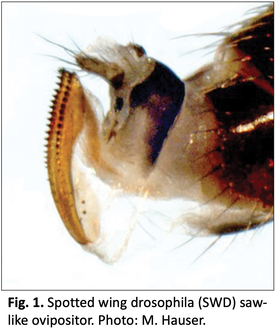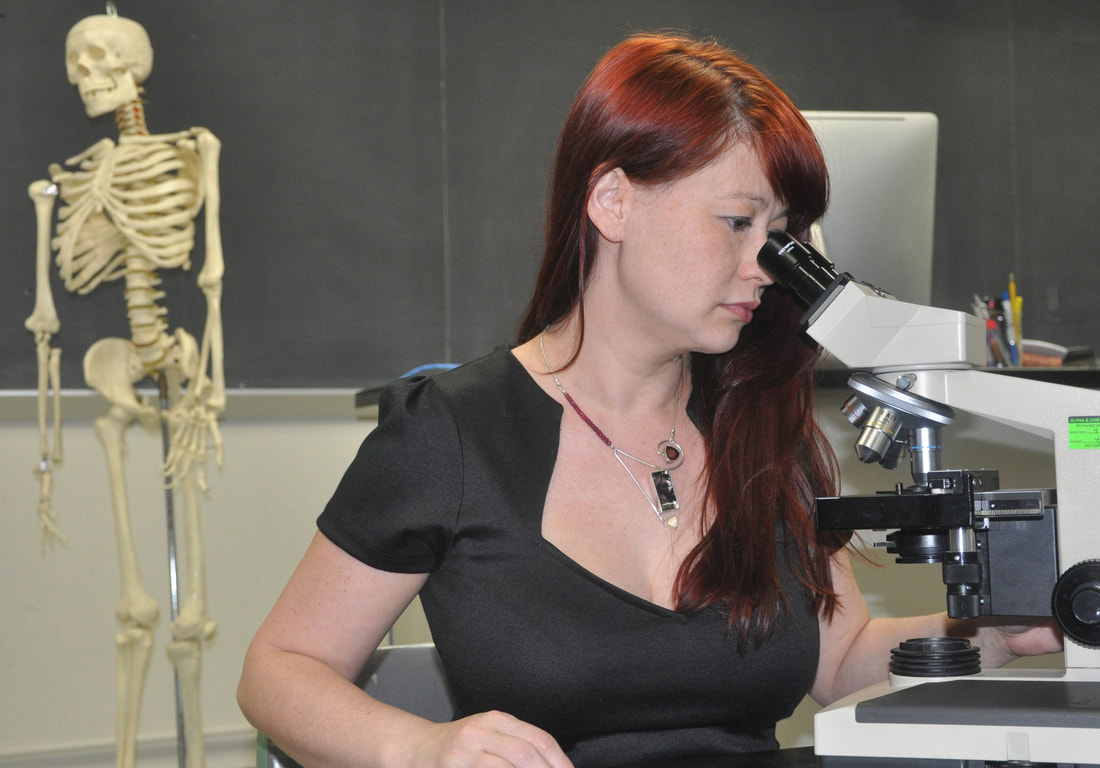[Seminar blog] The end of spray and pray? Alternative ways to control spotted wing drosophila4/25/2022
 written by: Maria Cramer and Huiyu Sheng Spotted wing drosophila (SWD) is a pest that causes backyard berry growers and commercial farmers alike a lot of grief. Native to Eastern Asia, this fruit fly (closely related to the famous Drosophila melanogaster) first appeared in the mainland U.S. in 2008. Like other fruit flies, SWD lays eggs in fruit, but unlike others, it has a sharp ovipositor that allows it to cut through fruit skin and lay eggs inside (Figure 1). Because of this, SWD larvae aren’t restricted to rotting or damaged fruit– they can infest otherwise perfect produce. Their favorite fruits include raspberries, blackberries, grapes, and cherries. Besides the ick-factor, the wounds from cutting into fruit can introduce microorganisms that cause the fruit to rot. To make things worse, because they’re inside fruit, the larvae are protected from insecticide sprays (Figure 2). This means farmers have to instead target the adult flies, which requires frequent insecticide applications. Spraying insecticides over and over has many downsides; it’s expensive for farmers, it could hurt other insects, and it could even put pressure on SWD to develop resistance to the chemicals themselves, making them less effective. Dr. Torsten Schöneberg would love to see an end to this “spray and pray” approach for managing SWD. Currently a researcher at Agroscope in Switzerland, Dr. Schöneberg recently completed a postdoc in the Hamby Lab at the University of Maryland. He returned to the Entomology Department’s weekly seminar series to give an update on the research he did during this time. [Seminar Blog] Mitey talk: Dr. Zachary Lamas' exit seminar on honey bee's disease transmission4/19/2022
Beyond the honeybee: How many bee species does a meadow need for pollination and ecosystem health? Way more than previously known according to a new study by UMD Ento's postdoctoral associate Michael Roswell. Follow link to read full AGNR article, https://go.umd.edu/qD2
Share on facebook: https://www.facebook.com/UMDAGNR/posts/10159818456417248 Share on twitter: https://twitter.com/UMD_AGNR/status/1514231618260586502?s=20&t=NsKizr_un7P_ZwbYR3mC_A
The Entomological Society of America's Eastern Branch Early Career Award recognizes early professionals who have made outstanding contributions to entomology, shown commitment to extension or outreach, and excelled in entomological education. Congratulations to Dr. Karin Burghardt, the recipient of this year's award!
Dr. Karin Burghardt is an Assistant Professor and Extension Specialist in the Department of Entomology at the University of Maryland College Park. Trained as a community ecologist, she specializes in understanding plant-insect interactions in human-modified landscapes ranging from suburban yards to abandoned agricultural fields to managed forests. Her research and extension program helps determine best practices for how humans can share space with a variety of flora and fauna. In April, Karin will be honored at the Eastern Branch Meeting in Philadelphia and entered for consideration for the Society–level award given at ESA's Annual Meeting. Congratulations again on the well-deserved recognition Dr. Burghardt! Share on facebook and twitter. written by: Kathleen Evans
While there remains more to learn about the functional role that biodiversity plays in agroecosystems, it is evident that high-diversity ecosystems promote important ecosystem services such as decomposition and nutrient cycling, pollination, and biotic pest control (Tscharntke et. al. 2005). Biodiversity is thought to provide ecosystem stability and resilience to disturbance, but such evidence is scarce. Significant losses in biodiversity occurred during the post-war era when agriculture practices transformed from traditional to modern and rapid agriculture intensification practices created more homogeneous and simplified landscapes (Tscharntke et. al. 2005; Vandermeer 1997). Unfortunately, there is still a knowledge gap in our understanding of how changes in land-use and simplification have altered the local and regional ecological processes, community structure and ecosystem services. Interaction networks enable us to understand how ecological communities assemble and function and is a useful tool for measuring changes in the stability and resilience of ecological communities. Dr. Adam Vanbergen, Director of Research (écologie des insectes) UMR Agroécologie in Dijon, France, studies interspecific interaction networks (e.g. plant- pollinator) and ecosystem services (e.g. pollination) and how they are affected by environmental change and kindly shared his work with the UMD Entomology Department at our weekly seminar series.
|
Categories
All
Archives
June 2024
|
Department of Entomology
University of Maryland
4112 Plant Sciences Building
College Park, MD 20742-4454
USA
Telephone: 301.405.3911
Fax: 301.314.9290
University of Maryland
4112 Plant Sciences Building
College Park, MD 20742-4454
USA
Telephone: 301.405.3911
Fax: 301.314.9290



 RSS Feed
RSS Feed




